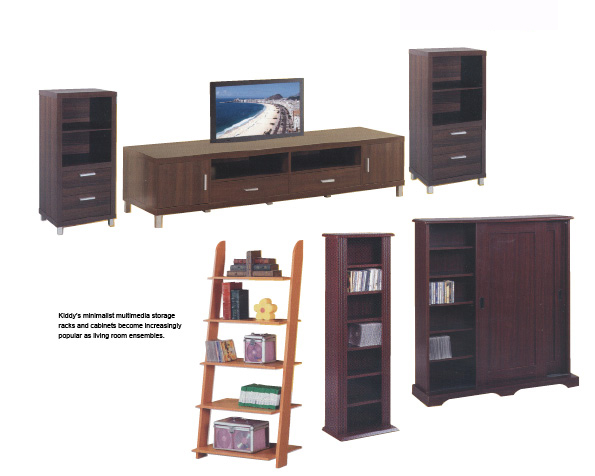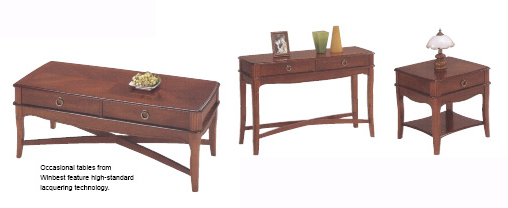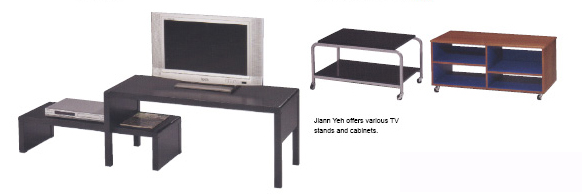Keeping Operations at Home Works for Taiwan-based Furniture Makers
2010/01/05 | By Judy Li
Both living rooms and their furnishings have over the years evolved according to changing lifestyles as well as dictates by interior decorators, furniture designers and gurus. Traditionally living room sets include a sofa and matching armchairs and coffee tables as well as occasional tables; however, today, with changing demographic compositions, economics and distractions, living rooms often double as family rooms or recreation rooms, so can also house entertainment stands, multimedia cabinets, and maybe even exercise equipment.
The increasing sophistication of video gaming and other electronic entertainment devices as Wii has also shaped the design of home furnishings. These gaming devices often induce consumers to buy larger flat-screen TVs that call for furniture makers to redesign entertainment stands to suit; while tech geeks are predicting the eventual development of a multimedia platform in homes that can multitask as TV, sound system, gaming console, PC and even video-phone, with such demand to trigger new ideas for designers and makers of traditional entertainment centers that accommodate only TV and stereo.
Taiwan-based makers of TV or entertainment stands have also been keeping up with the times, turning out various styles made of assorted materials. Such stands are often used alone or can be mated with other furnishings. And with rising affluence in emerging markets, consumers can now afford multiple TVs, a trend that is also driving demand for TV stands.
Kiddy Corp.
Going back some three decades, Kiddy Corp. specializes in making particle board and MDF (melamine density fiberboard) furniture. "The company was founded in 1979 in Taiwan and turned out a variety of furniture destined mainly for the United States," notes Yoko Liu, the manager. "Worsening manufacturing environment at home forced us to find cheaper labor overseas. After careful investigation, we finally established a plant in Shenzhen of Guangdong Province in 1998 and moved virtually all our production lines, leaving Taiwan to only process orders."
Today Kiddy has some 500 workers at the Shenzhen plant measuring 60,000 square meters. "We mainly make CD storage stands & shelves, TV stands & cabinets, bookshelves, display racks etc., most of which are made of MDF sourced from Malaysia, Thailand, Australia and New Zealand, where forests are replanted," says Liu.

Heavyweight Customers
Last year Kiddy made 3.6 million pieces of furniture, all of which exported to the U.S., U.K., France and Germany. "Our major clients are Wal-Mart, Best Buy, Next, Argos, Mama and Carrefour, to whom we offer on average 50 to 60 new samples per month that are developed by our in-house, 13-member R&D team," says Liu.
"To reduce manufacturing cost, we keep upgrading automation. About two years ago we spent about one million euro on an advanced four-size edge bender from Italy, where we also imported an automatic boring machine," Liu says. "Currently the proportion of automation at our China plant is 50%, which we will upgrade to 70%."
To be eco-friendly, Kiddy uses mainly non-toxic materials. "W use mostly glass, metals and plywood, which are recyclable, while our products meet E1 standard set by the European Union," Liu assures.

Winbest Enterprise
Engaging in the furniture industry for almost two decades, Winbest Enterprise Co., Ltd. is a leading maker in Taiwan of wooden knockdown (K/D) coffee tables, end tables, TV cabinets and a variety of small, household ornaments.
Unlike many of its peers who have moved offshore for lower cost, Winbest has stayed put mainly for familiarity. "Despite the unfavorable domestic manufacturing environment, we still feel at home on the island for we get used to everything here," notes Judy Huang, the president. "We can survive in the industry and market as long as we keep enhancing product quality."
Huang is proud of the capable, in-house R&D team that develops innovative products, claiming that her company is among the leading furniture manufacturers in Taiwan, being especially skilled in lacquering technology. "We apply translucent lacquering technology meeting American standards that are very popular among high-end consumers," Huang states.
"Our products are made of either solid wood or medium-density fiberboard or composite materials, including glass and polyvinylchloride (PVC) leather to enhance diversity. Currently we offer around 200-300 furniture items in different patterns and models," Huang says.
Originally Winbest exported all its products mainly to the United States, then began about 10 years ago to do business in Taiwan. "Half of the company's output is exported, with the remainder going to the domestic market, which is likely to take up 60% of output in the near future with growing demand," Huang points out.
Winbest's major export outlets are Japan, the U.S., U.K., Italy and the Middle East. "Seeing the growing market in China, we started to work with traders about two or three years ago to win orders," Huang adds. "Despite the global economic slowdown, we still have been achieving annual growth of 7%-8% in revenues in recent years."
An unfortunate setback has not stopped Winbest's progress: A fire on July 10 this year razed the company's factory in Fengyuan in Taichung County, central Taiwan. Shortly thereafter a new one has been established in Shenkang Township, also in Taichung County. "Despite being frustrated and depressed, I urged myself and the employees to leave misfortune behind to look ahead. The reality of doing business remains unchanged and moping does little good. I am fully confident that we can get back on the saddle," Huang confirms.
Jiann Yeh Wood
Founded in 1992, Jiann Yeh Wood Co., Ltd. is adept at making stylish modern living room furniture, including occasional tables, end tables, chairs and TV stands. Unmoved by the wave of migration to China over the years, the company remains adamant to be loyal to home advantages for business has been good regardless.
"We prefer keeping manufacturing in Taiwan because we can easily find reliable materials suppliers and subcontractors here," explains Anne Chen, a sales assistant. "Besides, we believe quality of materials and workers in Taiwan exceed those in China and Southeast Asia."
To create uniquely designed furniture, the company uses a variety of materials, including fiberboard, bentwood, plastic plywood, steel tubing, and glass, many of which are highly praised by customers.
Jiann Yeh exports all its products to Japan. "Our Japanese clients demand high-quality products in small volume, so we have to be flexible enough to meet such special needs," Chen says. "Repetitive discussions with Japanese clients are necessary before manufacturing, which can be tedious but also can motivate us towards improving products."
Imported Woods
In addition to glass and metals provided by local suppliers, the company also imports woods from Canada and Malaysia. "Our line features the three key ingredients of quality, design and practicality, while our capable R& D team develops new products quarterly," Chen emphasizes.
To become more cost-efficient, Jiann Yeh continues to upgrade production facilities and downsize workforce, in addition to partnering with more than 50 satellite plants on the island for supplies of furniture parts, which also enhances production efficiency.
Despite the global recession, the company currently ships about four containers of furniture to Japan each month, also aiming to expand market share there in the future.




